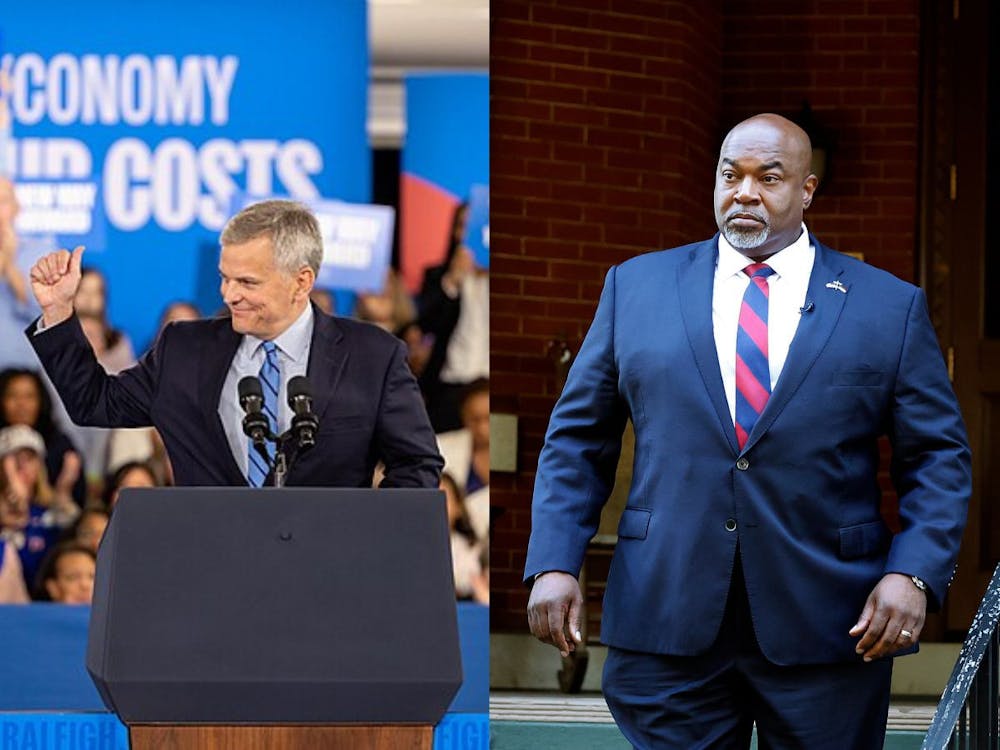With Election Day fast approaching, North Carolina is receiving increased attention as one of a few swing states that could decide this year’s presidential election. But another race within the state has made national headlines in recent weeks — the battle for governor.
Two major candidates are vying for the gubernatorial position in North Carolina: Democratic nominee Josh Stein and Republican nominee Mark Robinson. Stein currently leads Robinson by roughly 14 points as of Tuesday.
Although most eyes are on the presidential race, Asher Hildebrand, professor of the practice in the Sanford School of Public Policy, emphasized the direct impact state-level governance has on college students.
“If you are thinking about not just being here as a college student, but working here, living here, maybe one day raising a family here, the governor’s race might be far more significant for the actual impact on your day to day life than the race for president or the race for Congress,” he said.
Here’s a look into the gubernatorial candidates’ records and campaign platforms ahead of Election Day.
Josh Stein
Stein is nearing the end of his second term as North Carolina’s attorney general and would be North Carolina’s first Jewish governor, if elected.
A native of Chapel Hill and Charlotte, he attended Dartmouth College and Harvard’s Law School and Kennedy School of Government. He was elected to the North Carolina General Assembly as a senator in 2008 and remained there until he assumed the attorney general position in 2017.
Stein’s gubernatorial campaign emphasizes the importance of education, women’s rights, job opportunities and uplifting working families. He has been dedicated to combating the opioid crisis as attorney general, notably co-directing a $56 settlement with pharmaceutical manufacturers and distributors, and hopes to continue his work curbing drug overdoses as governor.
Pope McCorkle, Law School ’84 and professor of the practice in the Sanford School of Public Policy, said Stein presents similarly to his mentor, Gov. Roy Cooper, but with slightly more progressive policies and more of a “suburban feel.”
“Stein is in the democratic tradition of moderate, progressive, capitalist development; bring in jobs, get people more educated and don’t rock the boat on cultural issues,” McCorkle said.
Though, McCorkle pointed to women’s reproductive rights as one of the main issues dividing the two main candidates’ platforms — a controversial topic Stein takes a harder stance on.
Stein supports protecting access to reproductive care, including contraception, in vitro fertilization (IVF) and abortion. He has promised to “veto any efforts to criminalize women’s freedom over their own bodies.”
Mark Robinson
Stein’s opponent, Robinson, is nearing the end of his first term as North Carolina’s lieutenant governor. A win for Robinson would be historic for the state, cementing his position as its first Black governor.
A Greensboro native, Robinson was thrust into the political scene in 2018 when he attended a city council meeting in his hometown and gave an impassioned speech about Second Amendment rights that went viral. Previously, Robinson served in the United States Army Reserves and worked in furniture manufacturing before starting a small business with his wife, Yolanda Robinson. She was eventually required to pay back North Carolina $132,000 after a 2024 state investigation into the business’ finances and alleged violations.
Robinson’s gubernatorial campaign prioritizes easing regulations on businesses and taxes and improving education, public safety and veteran care. Using his previous experience in office and working class background, he plans to prioritize the economy as governor. Though, some of his more conservative stances on abortion — including a “zero week” abortion ban — and anti-LGBTQ education are not officially outlined in his campaign platform.
Robinson came under fire earlier this year for his stringent views on abortion after revealing in an Aug. 2 advertisement that his wife, Yolanda Robinson, had an abortion in the 1980s.
The past month has seen explosive recent developments for Robinson, most notably a Sept. 19 CNN report linking him to explicit comments on pornographic messageboards. Investigations revealed that Robinson allegedly labeled himself a “Black Nazi,” expressed support for reinstating slavery and promoted anti-transgender rhetoric, among other inflammatory statements.
In the aftermath of the CNN report, several important staffers resigned from Robinson’s campaign and lieutenant governor’s office, while several prominent figures in the GOP also pulled their support. Former president Donald Trump has distanced himself from Robinson in a departure from previously endorsing the gubernatorial hopeful’s campaign in March and appearing with him on multiple occasions.
Despite pressure from his party to drop, Robinson has reaffirmed that he will maintain his candidacy.
Hildebrand described Robinson as a “far less conventional candidate” and a “polarizing figure” in politics.
“He’s really emerged as, what some might say, the ‘leading edge,’ or the ‘bleeding edge’ of the [Make American Great Again] movement nationally,” Hildebrand said. He noted that while North Carolina has a history of political moderation, Robinson’s campaign represents a larger trend of heightened polarization on the national political stage.
Other candidates
Wayne Turner, the Green Party gubernatorial candidate, has worked in “minor party politics” since 2000 and co-founded voting reform organization Better Ballot N.C.
His top priority if elected would be education reform, advocating against “private education” for its ability to “reproduce social stratification and segregation along lines of economic class and race.” He has also said that all state employees and school personnel should receive a 10% raise in the next state budget.
Mike Ross, a small business owner and financial planner, is running as the Libertarian Party gubernatorial candidate. His goal is “defending liberty” and ensuring accountability of the state government.
Ross plans to strengthen public schools by encouraging “competition for dollars” so that they will “have to improve or be replaced by a superior free market education solution.”
Get The Chronicle straight to your inbox
Signup for our weekly newsletter. Cancel at any time.
Mia Taubenblat is a Trinity first-year and a staff reporter for the news department.

